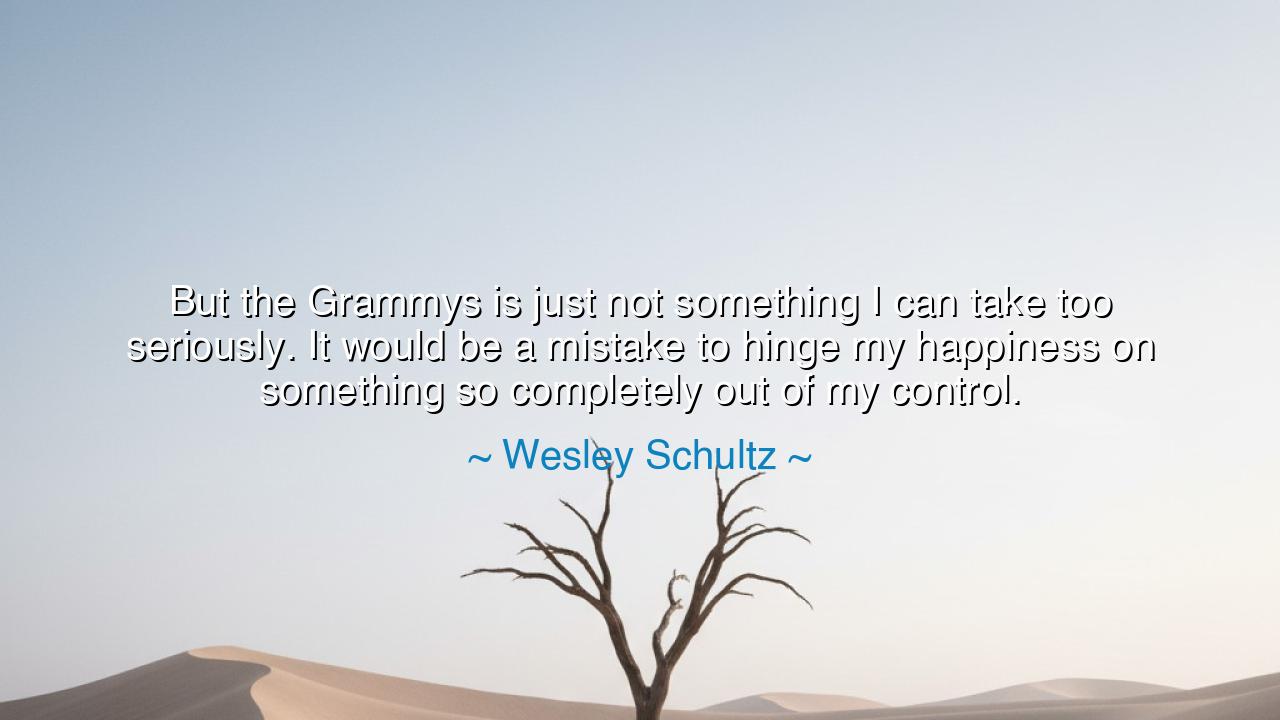
But the Grammys is just not something I can take too seriously.
But the Grammys is just not something I can take too seriously. It would be a mistake to hinge my happiness on something so completely out of my control.






When Wesley Schultz, the voice and heart behind The Lumineers, said, “But the Grammys is just not something I can take too seriously. It would be a mistake to hinge my happiness on something so completely out of my control,” he spoke with the quiet wisdom of one who has looked beyond the shimmering veil of recognition and seen the deeper truth of fulfillment. His words are a balm for the restless soul—a reminder that happiness must never be chained to circumstance, nor the worth of a person measured by the judgment of others. For what is fame, if not a shadow cast by the light of one’s labor? And what is glory, if it flickers with the winds of opinion? Schultz’s words call us to root our joy in creation itself, not in the applause that follows it.
The Grammys, symbol of prestige and success in the world of music, stands here as more than an award—it is a metaphor for all external approval, for the shimmering prizes the world dangles before the heart. Schultz, through hard years of writing, performing, and persevering, learned that the truest reward lies not in a trophy but in the act of honest expression. He speaks not from disdain but from understanding: that to surrender one’s happiness to forces beyond control is to hand over one’s peace to the tides of fate. The wise man, he reminds us, stands firm upon the shore, creating his art not for praise, but because the act itself is sacred.
The ancients too warned against this trap. Epictetus, the Stoic philosopher who had once been a slave, taught that peace belongs only to those who master their inner world. “Some things are up to us,” he said, “and some are not.” The wise man, he continued, does not anchor his contentment to fortune, for fortune is a fickle goddess. Instead, he cultivates virtue, effort, and truth, knowing that these are his own to command. So too does Wesley Schultz, in his humility, echo this timeless wisdom: that the measure of a life, or of art, lies not in the gold of recognition, but in the integrity of the work and the joy of creation.
History abounds with those who learned this same lesson. Consider Vincent van Gogh, who in his lifetime sold but one painting, and was dismissed as mad and failed by the society that later deified him. Had he hinged his happiness on their approval, his brush would have fallen silent. Yet he painted on—sunflowers, stars, and dreams—not for applause, but for love, for truth, for the fire that burned within him. It was not the world’s praise that made him great, but his devotion to his craft despite the absence of it. And so, in his solitude, he found the immortality that fame could never give.
To take anything “too seriously,” in Schultz’s sense, is to allow it dominion over the soul. The artist, the worker, the dreamer must learn detachment—not indifference, but freedom from dependence. When a man’s joy depends on outcomes beyond his reach, he becomes a captive to chance. But when he finds contentment in the doing—in the work, in the journey—then his peace is unshakable. The world may praise or scorn him; the awards may come or not; yet his heart remains steady, filled with the quiet satisfaction that he has done his best and lived his truth. That is the reward of the wise: tranquility born of mastery over self.
Yet Schultz’s teaching is not one of apathy—it is one of perspective. To strive is noble; to hope is human; but to let failure or fame define the spirit is folly. The true artist learns to celebrate the moment of creation, the song before it is sung to the crowd. Likewise, every person—whether artist or laborer, parent or leader—must learn to find meaning in effort itself, not merely in its fruits. The field does not bloom for applause; the river does not flow for fame; so too must we learn to act for the love of acting, to give without guarantee of reward.
So, my children of tomorrow, take this lesson to heart: do your best, and let go of the rest. Work with passion, love with courage, create with honesty, and let the world’s verdict be as it may. For happiness is not a prize bestowed—it is a state chosen, guarded, and cultivated within. Do not hinge your joy upon that which is beyond your grasp; plant it instead in the soil of your effort, and it will bloom in every season. The one who can say, as Wesley Schultz did, “I try my best and keep my peace,” walks the path of wisdom. For in that simple creed lies the freedom of the soul—the victory not of fame, but of inner harmony, which is the truest and most lasting of all rewards.






AAdministratorAdministrator
Welcome, honored guests. Please leave a comment, we will respond soon